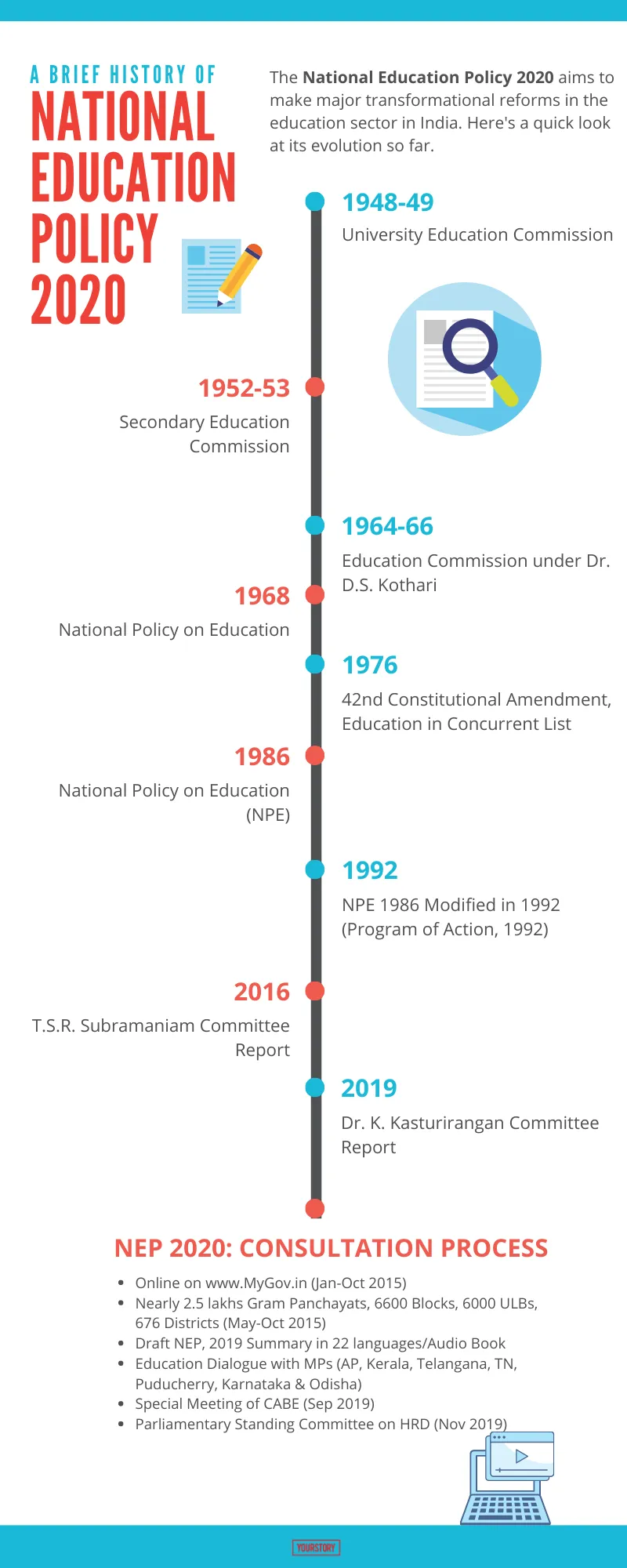Indian edtech startup ecosystem bullish on the new National Education Policy
Key stakeholders in the Indian edtech sector believe the new National Education Policy 2020 will build a workforce ready for the 21st century. Welcoming the reforms, experts explain why they are bullish on the Indian education space.
While announcing the new National Education Policy (NEP) 2020 yesterday, Union Information and Broadcasting Minister Prakash Javedkar said, “It is a new education policy for the 21st century. It is important, as for 34 years there were no changes in the policy.”

In an effort to make education more holistic, integrated, learner-centred, and flexible, the Indian government announced a new education policy – paving the way for a new era in the Indian education sector.
The 60-page draft entails some historic changes, completely transforming the education sector. Some of these include a credit-based system, one regulator for higher education institutions (except for legal and medical colleges), lesser focus on board exams, more focus on mother tongue by making regional language the medium of instruction up to Class 5, reduction in school curriculum to the core concepts, and integration of vocational education from Class 6 onwards.

Inforgraphic by Tenzin Pema
The HRD ministry — which has now been changed to the Ministry of Education — said that there will be no hard separation among arts, commerce, and science streams. In fact, students will have a choice to choose their subjects, such as maths and history, or music and chemistry together. The school model will also change from 10+2 to 5+3+3+4 from the next academic session, which is due to begin in September-October.
Even at the undergraduate degree level, the policy has brought in major alteration. The duration for such courses will now be three or four years, along with multiple entry and exit points with appropriate certification.
Further, an Academic Bank of Credit will be set up to enable digital storage of credits earned from different higher educational institutions, which can also be transferred and counted as part of the final degree.
Amidst all the hullabaloo, various market reports suggest that the new education policy will open doors for the edtech sector in India, which houses over 4,000 edtech startups.
Bridge ‘India’ and ‘Bharat’ gap
With the introduction of an Academic Bank of Credit, students belonging to Tier-II and III cities can get credits by just adapting online courses, Abhishek Gupta, Senior Consultant, RedSeer Consulting tells YourStory.
“The credit bank opens up the market for online higher education in a big way. The online players can start offering credits, and help small colleges come online and become more relevant in the new age,” he says.
Moreover, the new credit system will make India's education market similar to countries like the US, he adds. In fact, students will no longer be bound to be in colleges for three years, and they can pace their own learning journey.
“Focus on technology for educational efficiency is clear in this policy’s vision. Especially where e-courses will be developed in regional languages and technology would be extensive, and will be a core part of education planning, teaching, learning, assessment, teachers, students, and student training,” Sumeet Verma, CEO and Co-founder, , says.
He adds that this would be beneficial for students hailing from Tier-II and III towns, where growth and demand both are high, and will help ambitious youth to fulfil their dreams.
“With this move, there are new growth opportunities which await the edtech sector. Edtech players will now look at new paths to expand their learner base, explore new markets, especially in Tier-II and III cities, and introduce new offerings which will cater to the needs of this upcoming consumer segment,” Krishna Kumar, Founder and CEO, Simplilearn, says.
Digital learning
In a bid to ramp up digital learning, a National Educational Technology Forum (NETF) would be created, where e-courses will be developed in eight regional languages initially, and virtual labs will be set up, the new policy outlined.
Further, a dedicated unit to coordinate digital infrastructure, content, and capacity building will be created within the ministry to look after the online learning needs of both school and higher education. Teachers, too, will be given training in online educational methods relevant to the Indian situation to help bridge the digital divide.
Sunita Gandhi, Founder, Global Classroom Private Limited (GCPL) and Global Education and Training Institute (GETI), says, one of the interesting elements of the policy is to provide infrastructural and academic support to dropouts (rounding up to two crores) by formulating different ways of learning with the help of formal and informal education modes.
“There is a special provision for socially and financially challenged groups in the new policy. And, as we move towards a new normal of online teaching, the Cabinet has even dedicated a unit to manage digital infrastructure, digital content, and capacity building under their wings, to make sure all the e-education needs are fulfilled. I personally feel this policy will make way for far more institutional changes that our education board needs,” she adds.
New subject: Coding
In a virtual press meet, Anita Karwal, Secretary, Department of School Education and Literacy said that coding as a subject will be added in the academic curriculum from Class 6 and higher.
“Coding as a new subject right from Class 6 will give a lot more legitimacy to edtech players, and we can expect these platforms to have more offerings in coding. We already have players, including Toppr, BYJU’s, and WhiteHat Jr., and now, we can expect all others to offer it as well,” says Abhishek from RedSeer.
Zishaan Hayath, CEO and Co-founder of , says, “The 21st-century workforce will be way different from today. It will be centred around technologies that did not exist 20 years ago and technologies that are yet to be created. This is a great opportunity for the edtech sector, and with contribution from edtech startups, the education system would benefit immensely.”
Key enabler
According to the NEP, in the next decade, India will have the highest population in the world. Further, it is targeting a 50 percent gross enrolment ratio (GER) in higher education, which is currently at 25 percent.
Abhishek highlights that online education will be able to fill the gap which many offline colleges unable to report.
“If we are able to combine this with skill-based education, focussing on what the contemporary needs of the industry are, we will be able to create world-class talent in India in pure absolute numbers because of our demographics," Sumesh Nair, Co-founder of Board Infinity, says.
Anuragi Raman, Co-Founder and CEO of CollegeDoors, says NEP 2020, if implemented properly, is going to give India much better skilled and capable human capital - a key ingredient for the holistic development of any society.
"Initiatives like PARAKH will be instrumental in achieving the goal. Strengthening SWAYAM and DIKHSA will not only democratise the access to quality content but also will help in reaching remote corners of the country for the benefit of both - teachers and students. Removing the language barrier through the use of technology will also help inclusiveness," he adds.
Investors’ sentiments
Amidst the pandemic, many edtech startups managed to raise significant funding. The sector set out to fill the gap which the COVID-19 pandemic brought with it, providing education from the comfort of home. And, investors did not shy away from helping these startups scale.
Anupam Saronwala, Angel Investor, Indian Angel Network, and Charter Member, TiE Delhi-NCR, says, "With schooling expanding from 10+2 to 5+3+3+4, and adoption of local language medium of instruction, it allows startups to leverage deep technologies such as AI, ML, AR/VR/XR, and adopt innovative business models to make a significant impact on the student’s learnings and their growth."
“Be it the option of studying arts and sciences together, which will make Indian student the global student now - and thus bolster our acceptance rates in global universities, or be it welcoming foreign colleges to set up campuses in India, which will help us take our own quality up by many notches and give higher education-tech companies a chance to build the next-gen of career growth tools — the document collects various pieces together, beautifully,” Akshay Chaturvedi, Founder and CEO of says.
(With inputs from Sindhu Kashyap)
Edited by Suman Singh








